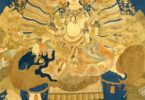《百喻经》
[The] Sūtra [Of A] Hundred Parables
(三三)斫树取果喻
(33) Parable [Of] Cutting [The] Tree [To] Obtain [Its] Fruits
昔有国王,有一好树高广极大,当生胜果香而甜美。
[In the] past, [there] was [a] country’s King, [who] had a beautiful tree [that was] tall, wide [and] extremely big, [that] will grow supreme fruits [that are] fragrant and sweet.
时有一人来至王所,王语之言:「此之树上将生美果,汝能食不?」
Then, [there] was a person [who] came [and] arrived [at the] King’s place. [The] King spoke [to] him, saying, ‘On this tree above, [that] will grow sweet fruits, [are] you able [to] eat [them or] not?’
即答王言:「此树高广,虽欲食之何由能得?」
Then replying [to the] King, saying, ‘This tree [is] tall [and] wide, although desiring [to] eat them, [with] what cause [am I] able [to] get [them]?’
即便断树望得其果,既无所获徒自劳苦,后还欲竖,树已枯死都无生理。
Immediately cutting [the] tree, hoping [to] get its fruits. Thereupon, without those obtained, in vain toiling [with] suffering, later still desiring [it to be] erect, [with the] tree already withered [and] dead, [it was] already without growth’s principle.
世间之人亦复如是,如来法王有持戒树能生胜果,心生愿乐欲得果食,应当持戒修诸功德,不解方便,返毁其禁,如彼伐树,复欲还活都不可得,破戒之人亦复如是。
People of [the] world [are] likewise thus. [The] Thus Come [One, the] Dharma King has upholding [of] precepts’ tree, [that is] able [to] grow supreme fruits. [With their] minds giving rise [to the] wish [for] bliss, desiring [to] get [the] fruits [to] eat [them, they] should uphold [the] precepts’ all meritorious virtues. Not understanding [this] skilful means, instead destroying [their] prohibitions, like that cutting down [of the] tree, again desiring [it to] still live, all [these] cannot [be] attained. Of people breaking [the] precepts, [they are] likewise thus.
[Note 1: There should be proper understanding of the need to first plant (and grow) the cause (因) of guarding the precepts (守戒) well, before reaping their fruits (i.e. 果: effects) of bliss naturally. Those with inverted (颠倒) thinking, craving for bliss, quickly break the precepts instead, assuming they can attain bliss directly.
True bliss cannot be attained with the breaking of precepts. Any other so-called ‘bliss’ experienced with broken precepts is immoral, karmically leading to suffering eventually. There might be those who pretend to observe the precepts outwardly, while breaking them secretly, thus not personally having profound faith in cause and effect (深信因果), even as they hypocritically teach others to believe in the law of karma.]
[Note 2: When there is a precept broken, there should immediately be the 3R‘s – sincere Repentance (忏悔) for the precept broken, Resolution to not break it again, and ‘Revival’ of the precept, by not letting it remain ‘dead’, and by not ‘killing’ the other precepts. Instead, there should be better observation of all precepts after. (True Repentance should already include Resolution and Revival as above, but they are at times forgotten.)]
Namo Amituofo : Translation and notes by Shen Shi’an
上个喻
Previous Parable:
估客偷金喻
[32] The Parable Of The Merchant Guest Who Stole Gold
https://purelanders.com/2023/08/23/32-the-parable-of-the-merchant-guest-who-stole-gold-from-the-sutra-of-a-hundred-parables
下个喻
Next Parable:
送美水喻
[34] The Parable Of Delivering Sweet Water
https://purelanders.com/2023/08/23/34-the-parable-of-delivering-sweet-water-from-the-sutra-of-a-hundred-parables
全百喻
All Hundred Parables:
https://purelanders.com/baiyu





